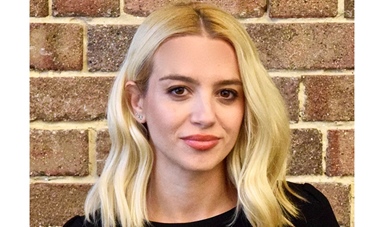Loading component...
At a glance
Advances in technology are speeding up money transfers across the globe, but the convenience comes with a catch. Shady transactions can be more challenging to trace.
Despite measures such as Australia’s Anti-Money Laundering and Counter-Terrorism Financing Act 2006 (AML/CTF) to deter underhand dealings, the United Nations Office on Drugs and Crime estimates global money laundering to total up to US$2 trillion each year.
Australian start-up bron.tech aims to reduce this figure by providing data verification services that help companies meet their AML/CTF obligations.
Founded in 2016 by Emma Poposka and Voidan Kardalev, bron.tech initially set out to redefine the economics of consumer data with a blockchain-secured platform to help individuals store and monetise their online personal data.
Users nominated the industries that could buy their data via the platform, and bron.tech would extract it for the buyer and distribute payment to users. However, its founders soon identified a far greater market for verified data.
The value of data
The original idea for bron.tech was sparked by Poposka’s frustration at gathering her personal data for an immigration visa to Australia from Macedonia in 2015. She estimates it cost close to A$10,000 to gather and verify the data.
“Ownership of personal data is a pain for individuals, but it was not big enough to justify an entire business model around it,” says Poposka, bron.tech’s CEO.
“We realised that one of the main reasons companies or governments ask for this verification process is to prevent money laundering, terrorism financing and fraud.
"We decided to repackage our offering to be more attuned to corporations. Our early strategy has completely changed and we are now fully B2B.”
The company has access to approximately 400 global data registries, which include information about individuals and companies across 180 countries.
“We partner with local and international data brokers and, in some cases, we get access to primary data or create our own data sources,” Poposka says.
She adds that bron.tech performs due diligence on its data providers and their sources.
Poposka says bron.tech’s clients include “most of the fintechs” in Australia. Its services include a pay-as-you-go package, where a company pays A$8 per individual verification according to AML/CTF protocols.
“Our verification also starts at A$8 for public Australian companies, SMSFs and registered trusts, and A$16 for private companies and unregulated trusts,” she says.
“We’ve structured our product in a way that our customers can access these databases and do the checks in accordance with legislation with just several clicks of a button.”
The firm uses blockchain technology to confirm verification.
“When you verify something through our system, you will receive a timestamp of when that verification occurred,” says Poposka.
“If you get audited by AUSTRAC [Australian Transaction Reports and Analysis Centre], you can prove the verified result and when you got it because it’s secured with blockchain.
"Hypothetically, if you want to bribe us to change the results, we couldn’t even if we wanted to because blockchain protects the entire system.”
bron.tech focuses on growth
In 2017, bron.tech received pre-seed funding of A$100,000 from BlueChilli’s female-focused accelerator program SheStarts, and A$60,000 from Telstra-backed start-up accelerator muru-D.
In December of that year, ASX-listed software company Ookami bought an 18.23 per cent stake in the company for close to A$1 million.
“Being part of an accelerator provided a good support network,” Poposka says.
“There’s a lot to be said about learning from experience. We didn’t have to go through that because we were learning from someone else’s experience.”
The company now employs 10 people and Poposka is focused on growth.
“We’re trying to get our product in the hands of as many customers as possible and to improve it based on their feedback.”
Poposka says bron.tech is exploring opportunities in the US.
“We’re looking to go there at the end of this year, and potentially incorporate and grow there,” Poposka says.
“Australia is a great market, but it’s still small. We would like to see how the same model would work in a bigger market.
“Regulated entities like banks and financial services firms don’t want to on-board criminals and money launderers to their platforms.
“It’s up to technology companies like ours to provide them with tools for early detection.”
One piece of advice
“Identify your product market fit. All your energy should be focused on getting to the point of product market fit.
"Nothing else is important before that. If you don't have product market fit, you'll fail.”

